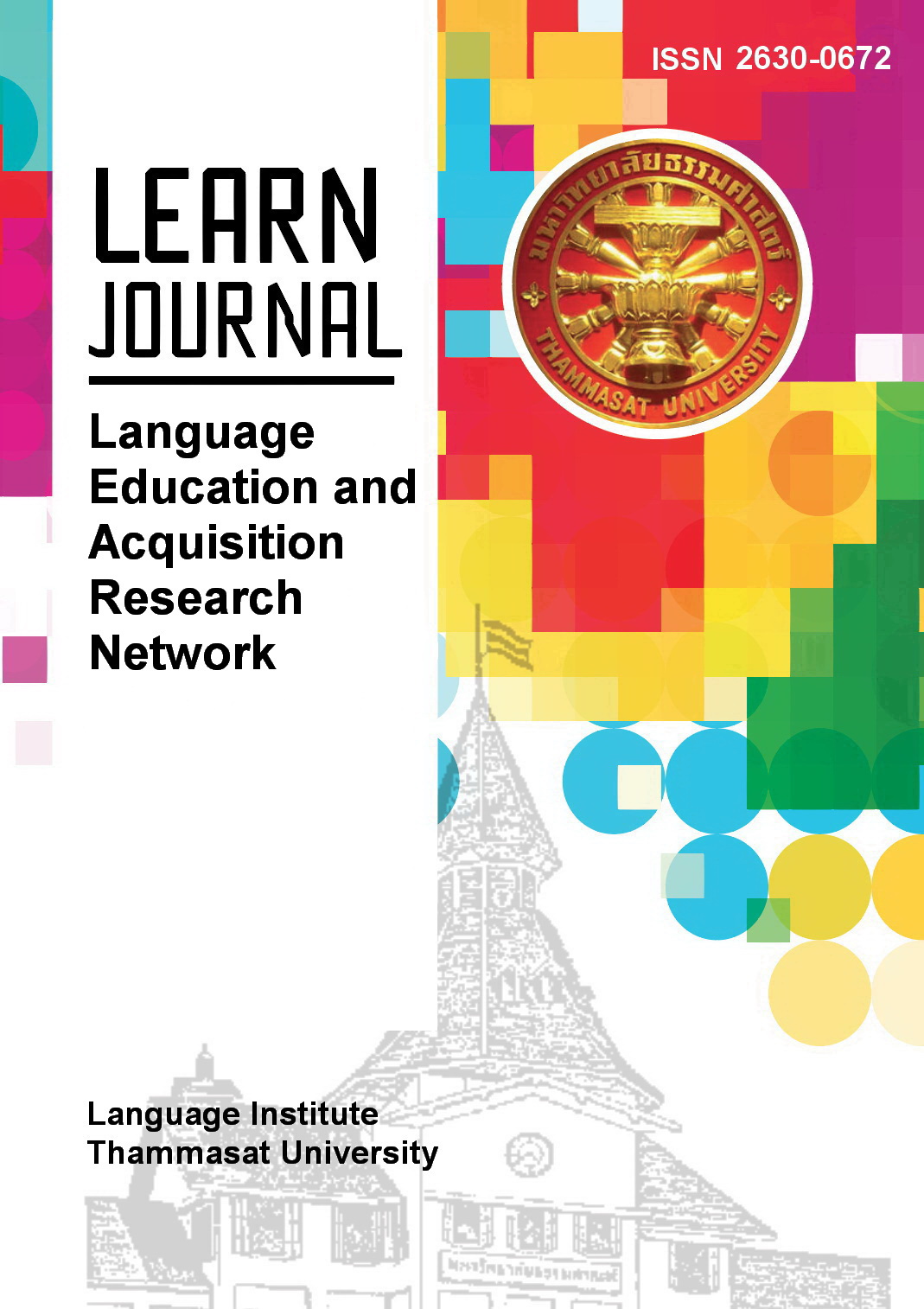Nonnative English Speaking Teachers Who Are Foreign Nationals in South Korea and Japan: A Continuing Struggle for Inclusion
Main Article Content
Abstract
It is widely considered that native English speaking teachers (NESTs) are more suitable to teach nonnative students than nonnative English speaking teachers (NNESTs). When it comes to NNESTs in an EFL setting, most are local nationals (LNNESTs). However, it should be noted that there is also a group of NNESTs who are foreign nationals (FNNESTs). Compared with LNNESTs, FNNESTs have the additional concept of ‘foreign’, which leads people to think that these teachers may neither show authentic proficiency of English nor understand the native language of the country. Thus, FNNESTs are often considered to be much less suitable to teach nonnative students than LNNESTs. There have been few studies focusing on FNNESTs. In this study, two studies of FNNESTs in Korea and Japan respectively were reviewed and compared. The two countries have almost the same perception about FNNESTs even though there is a slightly different point in the policy toward FNNESTs between the two countries. It was found that NESTs were perceived as the ideal model and FNNESTs were unfairly and/or discriminatively treated in both countries, a situation which could damage their identity as teachers.
Article Details
References
Balgoa, NG. (2019). Filipino English teachers in Japan: “Nonnativeness” and the teaching and learning of English. Journal of Language Teaching and Research, 10(2), 256–263.
Cabigon, M. (2015). State of English in the Philippines: Should we be concerned? Retrieved April 18, 2022, from https://www.britishcouncil.ph/teach/state-english-philippines-should-we-be-concerned-2
EPIK (n.d.). Greetings. Retrieved Apr. 17, 2022 from http://www.epik.go.kr/contents.do?contentsNo=83&menuNo=333
Honna, N. & Takeshita, Y. (1998). On Japan's propensity for native speaker English: A change in sight. Asian Englishes, 1(1), 117-134. DOI: 10.1080/13488678.1998.10800997
Jeon, M. (2010). Globalization and South Korea’s EPIK (English Program in Korea). In V. Vaish. (Eds.), Globalization of language and culture in Asia: The Impact of Globalization Processes on Language (pp. 161-179). Continuum.
JET (n.d.). Eligibility. Retrieved Apr. 19 2022. from http://jetprogramme.org/en/eligibility/
Kachru, B. (1992). World Englishes: Approaches, issues and resources. Language Teaching, 25(1), 1-14. https://doi.org/10.1017/S0261444800006583
Kavanagh, B. (2016). Native speakerism and English language education in Japan. Tohoku University of Repository, 2, 201-209.
Korvia (2015). E2 Teaching Visa Guide. Retrieved Apr 19, 2022 from https://www.korvia.com/e2-visa-korvia-guide/
Kudaibergenov, M. & Lee, K. (2022). Professional identity tensions in EFL preservice teachers: A collective case study of three international students in South Korea. Journal of Language, Identity & Education. https://doi.org/10.1080/15348458.2022.2038174
Lee, J. (2011). Globalization and Language Education: English Village in South Korea. Language Research, 47(1), 123-149.
Lee, Y. (2021). Examining racialized English language teaching in South Korea: Insights into language teacher identity formation [Unpublished Doctoral Thesis]. Hong Kong University.
Llurda, E. (2015). Non-native teachers and advocacy. In M. Bigelowand & J. Ennser-Kananen (Eds.), The Routledge handbook of educational linguistics (pp. 105-116). Routledge.
McKenzie K. (2013). How do social factors cause psychotic illnesses?. Canadian journal of psychiatry. Revue canadienne de psychiatrie, 58(1), 41–43. https://doi.org/10.1177/070674371305800108
Ruecker, T., & Ives, L. (2015). White Native English Speakers Needed: The Rhetorical Construction of Privilege in Online Teacher Recruitment Spaces. TESOL Quarterly, 49(4), 733–756.
San Jose, B, & Ballescas, M. R. P. (2010). Engaging multiculturalism from below: The case of Filipino assistant language teachers in Japan. Journal of Asian Studies for Intellectual Collaboration, 1(1), 162-178.
Shibata, M. (2010). How Japanese teachers of English perceive non-native assistant English teachers. System, 38, 124-233.
Sugimoto H. & Yamamoto, A. (2019). Employment issues of Filipino assistant language teachers in Japan. Journal of Graduate School of Education of Kyoto University, 65, 179-200.
Walkinshaw, I. & Oanh, D. H. (2014). Native and non-native English language teachers: Student Perceptions in Vietnam and Japan. SAGE Open, 4(2), 1-9. https://doi.org/10.1177/2158244014534451
Wang, Y. (2012). Moving towards the transition: Non-native EFL teachers’ perception of native-speaker norms and responses to varieties of English in the era of global spread of English. Asian EFL Journal, 14(2), 46-78.
Yuasa, K. (2010). English Textbooks in Japan and Korea. Journal of Pan-Pacific Association of Applied Linguistics, 14(1), 147-158.


